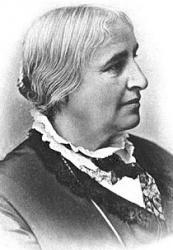
1824 - 1904 Person Name: Edna Dow Cheney Author of "At first I prayed for light" in Hymns of the Spirit for Use in the Free Churches of America Ednah Dow Littlehale Cheney (June 27, 1824 – November 19, 1904) was a writer, reformer, and philanthropist, born on Beacon Hill, Boston to Sargent Smith Littledale and Ednah Parker (Dow). She was educated in private schools in Boston. She was secretary of the School of Design for Women from 1851 till 1854.
She married portrait artist Seth Wells Cheney on May 19, 1853. His ill health limited his volume of work and after a winter trip abroad (1854-1855) he died in 1856. They had one child, Margaret Swan Cheney (September 8, 1855 – September 22, 1882) Edna's daughter, Margaret Swan Cheney died of tuberculosis while a student in the 1882 class at MIT and a reception room of the Women’s Chemistry Laboratory was named in her memory.
After her husband's death she took an interest in social concerns such as the Freedman's Aid Society (secretary of the committee on aid for colored regiments and of the teachers' committee, 1863), Massachusetts Woman Suffrage Association (vice president), New England Women's Club (vice president) and the New England Hospital for Women and Children (secretary, 1862). She lectured at the Concord School of Philosophy on the history of art. She was an active member of the Margaret Fuller conversation class.
She went south to visit the Freedmen's schools in 1866, 1868, and 1869. She visited Europe several times, and spoke before lyceums west of New England in 1873, 1875, and 1876.
Works--
Patience: a series of thirty games with cards. 1870
Social games. A collection of 31 games with cards. 1871
Faithful to the Light and Other Tales. 1871
Sally Williams, the mountain girl. 1872
The Child of the Tide, By Ednah D. Cheney. 1874
Memoir of Susan Dimock: resident physician of the New England Hospital for Women and Children. 1875
Jenny of the Lighthouse. 1877
Memoir of Seth W. Cheney, artist. 1881
Gleanings in the Fields of Art. 1881
Louisa May Alcott, the Children's Friend. 1888
The Life of Louisa May Alcott. 1888
Memoir of John Cheney, Engraver. 1889
Nora’s return: a sequel to "The doll’s house" of Henry Ibsen / by Ednah D. Cheney. 1890
Memoirs of Lucretia Crocker and Abby W. May. 1893
Life of Christian Daniel Rauch of Berlin, Germany. Drawn from German authorities by Ednah D. Cheney. 1893
Reminiscences of Ednah Dow Cheney (born Littlehale). 1902
--en.wikipedia.org/wiki/
Ednah Dow Cheney


